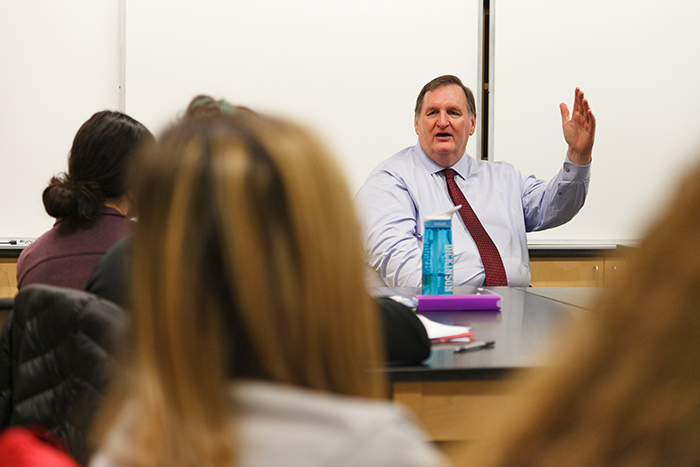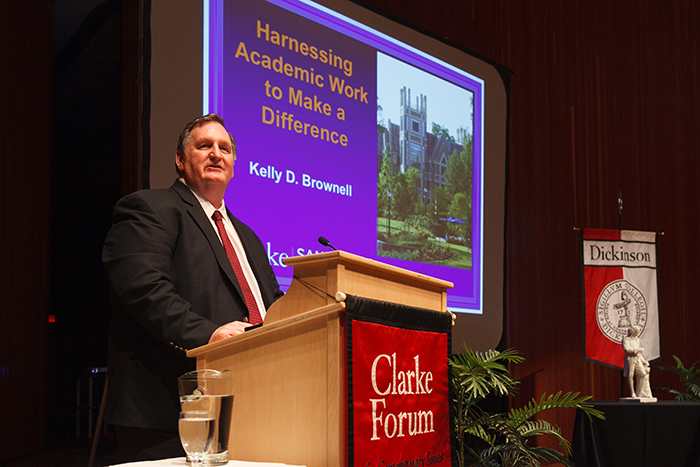Celebrating Science That Makes a Difference

Kelly Brownell, recipient of the 2016-17 Priestley Award, leads a small-group discussion with psychology students. Photo by Carl Socolow '77.
Award-winner champions science, policy to fight rising obesity rates
by MaryAlice Bitts-Jackson
It’s clear that obesity poses major health risks. What’s not so clear, in this age of obesity anxiety, is what we should do about it. Is medical intervention the best approach, or should we develop new health education programs? What about revamped school lunch programs or community gardens? Or should we regulate and legislate the food industry and keep a watchful eye on food marketing to children? All or none of the above?
“Our hope, as scientists, is that we can produce evidence-based suggestions for public policy where there’s actually uptake, and that the public-policymakers are actually paying attention to the research in order to create social change,” said Kelly Brownell, a leading expert in this ongoing national and international conversation who visited Dickinson to accept the Joseph Priestley Award and serve a brief residency. “But the question is: How good are we, really, at creating change? What’s the connection between our scholarship and the likelihood that things actually change out there in the world?”
Distinguished company
Presented annually in memory of the discoverer of oxygen, who was also a close friend of Benjamin Rush, the Priestley Award honors a distinguished scientist whose work has contributed to the welfare of humanity. Previous recipients include 15 Nobel Laureates and the dual Nobel Prize award-winning chemist Linus C. Pauling, as well as famed astronomer Carl Sagan and anthropologist Margaret Mead.

Kelly Brownell delivers the 2016-17 Priestley Lecture to a full house in the Anita Tuvin Schlechter Auditorium. Photo by Carl Socolow '77.
This year’s recipient is a renowned psychologist/neuroscientist, dean of Duke University’s Sanford School of Public Policy and former director of Yale University’s Rudd Center for Food Policy and Obesity who has published 15 books and more than 350 scientific articles and book chapters on nutrition, obesity and public policy. Best known for his work championing tax reform for high-calorie food and soda and for his research on food advertising directed at children, Brownell also has advised the White House, members of Congress, world health and nutrition organizations and media leaders on these issues and was named one of Time magazine’s “World’s 100 Most Influential People” in 2006.
Cutting through the jargon
While on campus, Brownell met with students and faculty in the psychology, health studies and food-studies programs, visited four psychology classes and delivered a public lecture, hosted by The Clarke Forum for Contemporary Issues, about how scientists can use scholarly research to help effect social change.
“He stressed the point that if we want to engage in the scientific field and make an impactful contribution to society, we have to clearly identify the change agent, conduct our research and draft our papers in a way that this agent can understand,” said Phuong Uyen "Winnie" Nguyen Le ’19 (educational studies, psychology), who would like to conduct similar research as a social scientist and education professional with a strong interest in food justice.
“I think this experience was really influential for those of us planning to have a career in psychology,” agreed Meghan Shippe ’19 (psychology, philosophy), who, after studying Brownell’s work while researching disordered eating, seized the chance to introduce the Priestley award-winner prior to his public address on campus. “I cannot imagine that many of my friends who go to other colleges or universities get to have this kind of experience, and I think that is something that is so special about Dickinson.”
Learn more
Published April 5, 2017